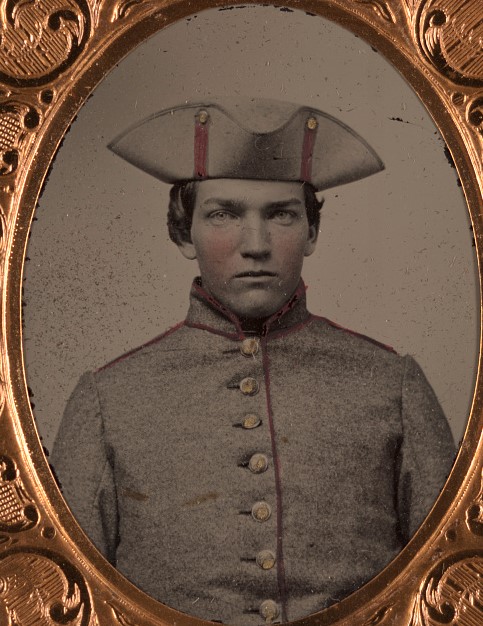Samuel Cole Wright
Samuel Cole Wright was born on September 29, 1842, in Plympton, Massachusetts, to Winslow and Mary Wright. His father was a farmer who owned $1,500 of real estate and $400 of personal property. He grew up and attended school in Plympton, and by 1860, he was working as a shoemaker.
He enlisted as a private in the 3rd Massachusetts Militia. One writer later claimed that Wright “was actually plowing his father’s field when he left the work unfinished in order to enlist.” He was eventually transferred to the 29th Massachusetts Infantry. He was wounded in the head on June 30, 1862, during the Peninsula campaign, but he eventually recovered and rejoined the regiment. He took part in the Battle of Antietam and later received the Congressional Medal of Honor for his actions there. He denounced northern Peace Democrats, writing that they “ought to have their necks streched [sic]” for “doing all they can to put us back and help the South.”
In July 1863, he wrote that he did not “want to see the President back down one iota on his Emancipation Proclamation for as long as slavery exists there will be a quarrel between the North & South.” He was shot in the left arm during the Battle of Cold Harbor on June 2, 1864, and shot in the right eye during the Battle of the Crater on July 30, 1864. He was eventually promoted to sergeant, and he mustered out on February 3, 1865.
Wright returned to Plympton after the war. He married Mary E. Nickerson, and their daughter Mary was born around 1875. He earned a living as a clerk, and by 1870, he owned $750 of real estate and $1,100 of personal property. They moved to Boston, Massachusetts, around 1872, and he took a job in the customs house. As one writer explained, he “was successively employed as messenger, night inspector, assistant weigher, first assistant weigher, head weigher and inspector of customs.” He died of myocarditis in Plympton on July 6, 1906.
Image: Samuel Cole Wright (courtesy Library of Congress)
DATABASE CONTENT
| (1951) | Wright, Samuel Cole | 1842-09-29 | 1906-07-06 |
- Conflict Side: Union
- Role: Soldier
- Rank in: Private
- Rank out: Sergeant
- Rank highest: Sergeant
- Gender: Male
- Race: White
Documents - Records: 30
- (3420) [writer] ~ Samuel C. Wright to Sister, 10 December 1862
- (6219) [writer] ~ Samuel C. Wright to Sister, 15 January 1865
- (6220) [writer] ~ Samuel C. Wright to Sister, 6 February 1863
- (6221) [writer] ~ Samuel C. Wright to Sister, 26 February 1863
- (6222) [writer] ~ Samuel C. Wright to Brother, 23 March 1863
- (6223) [writer] ~ Samuel C. Wright to Sister, 29 January 1863
- (6231) [writer] ~ Samuel C. Wright to Sister, 27 March 1863
- (6232) [writer] ~ Samuel C. Wright to Sister, 24 May 1863
- (6233) [writer] ~ Samuel C. Wright to Brother, 28 May 1863
- (6275) [writer] ~ Samuel C. Wright to Sister, 31 May 1863
- (6276) [writer] ~ Samuel C. Wright to Sister, 31 July 1863
- (6277) [writer] ~ Samuel C. Wright to Sister, 28 December 1864
- (6278) [writer] ~ Samuel C. Wright to Sibling, undated
- (6279) [writer] ~ Samuel C. Wright to Sibling, undated
- (6280) [writer] ~ Samuel C. Wright to Sibling, undated
- (6688) [writer] ~ Samuel C. Wright to Sister, 19 September 1861
- (6689) [writer] ~ Samuel C. Wright to Sister, 23 September 1861
- (6690) [writer] ~ Samuel C. Wright to Sister, 11 November 1861
- (6691) [writer] ~ Samuel C. Wright to Sister, 26 November 1861
- (6692) [writer] ~ Samuel C. Wright to Sister, 23 December 1861
- (6693) [writer] ~ Samuel C. Wright to Sister, 9 January 1862
- (6694) [writer] ~ Samuel C. Wright to Sister, 28 January 1862
- (6695) [writer] ~ Samuel C. Wright to Sister, 10 April 1862
- (6696) [writer] ~ Samuel C. Wright to Sister, 24 April 1862
- (6697) [writer] ~ Samuel C. Wright to Sister, 6 June 1862
- (6698) [writer] ~ Samuel C. Wright to Sister, 12 June 1862
- (6699) [writer] ~ Samuel C. Wright to Brother, 25 June 1864
- (6700) [writer] ~ Samuel C. Wright to Sister, 5 August 1862
- (6701) [writer] ~ Samuel C. Wright to Mary C. Wright, 22 August 1862
- (6710) [writer] ~ Samuel C. Wright to Sister, 5 November 1862
People - Records: 3
Places - Records: 1
- (1082) [birth, death] ~ Plympton, Plymouth County, Massachusetts
Regiments - Records: 2
SOURCES
1850, 1860, 1870, 1880, and 1900 United States Federal Censuses, available from Ancestry.com; Civil War Soldier Records and Profiles, 1861-1865, available from Ancestry.com; Massachusetts Town and Vital Records, 1620-1988, available from Ancestry.com; The Boston Globe, 8 July 1906; Samuel Cole Wright to Sister, 24 May 1863, Nau Collection; Samuel Cole Wright to Sister, 31 July 1863, Nau Collection.





